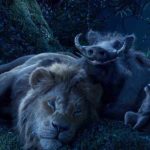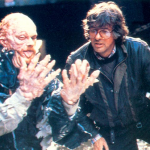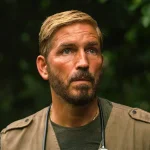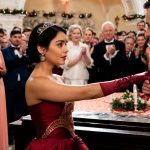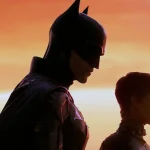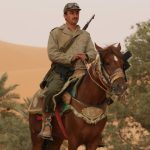🎬 The Northman (2022)
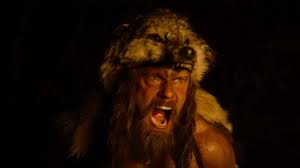
“The Northman” (2022): A Brutal and Visceral Tale of Vengeance and Fate
Robert Eggers’ The Northman (2022) is a ferocious and visually stunning exploration of Viking mythology and primal human instincts. Known for his meticulous craftsmanship in The Witch and The Lighthouse, Eggers brings his signature attention to detail to this historical epic, delivering a tale that is both operatic in its scope and intimate in its emotional depth. While steeped in Norse mythology and culture, The Northman is, at its core, a universal story of vengeance, destiny, and the cost of honor.
Plot Overview
Set in the brutal and unforgiving world of 10th-century Scandinavia, The Northman follows the journey of Amleth (Alexander Skarsgård), a Viking prince whose life is defined by a single, tragic moment: the murder of his father, King Aurvandill War-Raven (Ethan Hawke), by his uncle Fjölnir (Claes Bang). As a young boy, Amleth witnesses his father’s betrayal and barely escapes with his life, vowing to one day avenge his father, rescue his mother, Queen Gudrún (Nicole Kidman), and reclaim his kingdom.
Years later, Amleth has grown into a ferocious berserker, living as a warrior and raider. His journey for vengeance is reignited when he learns of Fjölnir’s whereabouts in Iceland. Disguising himself as a slave, Amleth infiltrates his uncle’s farmstead, waiting for the opportune moment to strike. Along the way, he forms a bond with Olga of the Birch Forest (Anya Taylor-Joy), a mysterious and cunning sorceress who becomes both his ally and his connection to humanity.
Themes: Vengeance, Destiny, and the Human Condition
At its heart, The Northman is a meditation on vengeance and its consuming nature. Amleth’s singular focus on avenging his father drives the narrative, but it also raises questions about the cyclical nature of violence and the price of honor. His quest is both heroic and tragic, as his unwavering commitment to destiny leaves little room for self-discovery or deviation from the path carved out for him by fate.
The film also grapples with themes of identity and choice. Amleth is torn between his role as an avenger and the possibility of forging a new life with Olga. This internal conflict adds depth to his character, elevating him beyond the archetype of the vengeful warrior.
The film’s exploration of Norse mythology and spirituality enriches its narrative. The concept of fate, or “wyrd,” looms large, with Amleth’s journey portrayed as both predestined and self-fulfilling. The story’s cyclical structure reflects the Norse belief in eternal recurrence, where the end of one saga heralds the beginning of another.
Character Performances
Alexander Skarsgård as Amleth
Skarsgård delivers a career-defining performance as Amleth, embodying the raw physicality and emotional intensity of a man consumed by vengeance. His transformation into a brutal yet vulnerable warrior is riveting, and his ability to convey internal conflict through minimal dialogue adds layers to his portrayal. Skarsgård’s commanding presence grounds the film, making Amleth a compelling and empathetic protagonist despite his brutal actions.
Anya Taylor-Joy as Olga
Anya Taylor-Joy shines as Olga, a character who provides both a counterbalance to Amleth’s rage and a sense of hope amidst the darkness. Olga’s intelligence, cunning, and spiritual connection to nature make her a fascinating foil to Amleth’s raw physicality. Taylor-Joy’s chemistry with Skarsgård is palpable, adding emotional stakes to the story.
Nicole Kidman as Queen Gudrún
Nicole Kidman delivers a nuanced and unpredictable performance as Gudrún. Her character’s complexity and moral ambiguity become a pivotal element of the narrative, challenging Amleth’s understanding of his family and his quest. A pivotal confrontation between Gudrún and Amleth is one of the film’s standout moments, showcasing Kidman’s ability to command the screen.
Claes Bang as Fjölnir
Claes Bang portrays Fjölnir as a formidable yet human antagonist. Unlike traditional villains, Fjölnir is not a caricature of evil but a man shaped by his own desires and struggles. Bang’s restrained performance adds depth to Fjölnir, making him a compelling counterpart to Amleth’s ferocity.
Supporting Cast
Ethan Hawke as King Aurvandill and Willem Dafoe as Heimir the Fool bring gravitas and eccentricity to their roles, particularly in the film’s early rituals that establish the spiritual and mythological underpinnings of the story. Björk’s cameo as a Seeress is haunting and otherworldly, adding a mystical layer to Amleth’s journey.
Cinematography and Visual Storytelling
Jarin Blaschke’s cinematography is a visual masterpiece, capturing the harsh beauty of the Scandinavian and Icelandic landscapes. The wide, sweeping shots of rugged mountains, volcanic plains, and stormy seas create an immersive and epic atmosphere. The film’s use of natural lighting enhances its authenticity, grounding the fantastical elements in a tangible reality.
Eggers’ meticulous attention to detail is evident in every frame, from the intricately designed costumes and weapons to the authentic depictions of Viking rituals and architecture. The film’s visual language is steeped in symbolism, with recurring motifs of fire, blood, and ravens reinforcing its themes of fate and transformation.
Mythology and Symbolism
The Northman is deeply rooted in Norse mythology, with its narrative structure and visual style drawing heavily from sagas and epic poetry. The film incorporates elements of shamanism, prophecy, and supernatural visions, blurring the line between reality and the mystical. Amleth’s encounters with the Seeress and his visions of Valkyries and Yggdrasil (the World Tree) connect his personal journey to the larger cosmology of Norse beliefs.
The recurring imagery of ravens symbolizes Odin, the god of wisdom and war, reinforcing Amleth’s connection to fate and his divine mission. The film’s climactic battle at the base of a volcanic mountain evokes Ragnarok, the apocalyptic end of the Norse world, underscoring the story’s mythic proportions.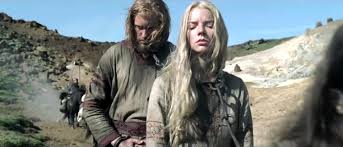
Action and Brutality
The action sequences in The Northman are visceral and unflinching, showcasing the brutal realities of Viking warfare. From the feral intensity of the berserker raids to the one-on-one duels, the combat is raw, chaotic, and grounded in historical authenticity. Eggers avoids glamorizing violence, instead presenting it as a grim and often horrifying necessity in a world defined by survival and conquest.
The film’s climactic duel, fought naked against the backdrop of an erupting volcano, is both symbolic and primal, serving as a fitting culmination of the narrative. The choreography emphasizes the physicality and stakes of the battle, creating a moment that is as harrowing as it is visually stunning.


